7 Best AI Reference Finder Tools in 2026: A Comprehensive Review
In the space of academic research, finding accurate references efficiently has become crucial for students, researchers, and professionals alike. AI-powered reference finders simplify this process by streamlining the search for reliable academic sources, allowing users to save time and focus on producing high-quality content. In this review, we explore seven top AI reference tools, highlighting their key features, pros, cons, and pricing to help you choose the best tool for your research needs.
What Are AI Reference Finder Tools?
AI Reference Finder tools are advanced digital platforms designed to streamline the process of finding, organizing, and citing academic references. These tools leverage artificial intelligence to assist researchers, students, and academics in discovering credible sources quickly and efficiently. Here’s how they work:
- Automated Research: They use AI algorithms to scan millions of academic papers, journals, and other scholarly content to provide relevant results instantly.
- Smart Citation Management: These tools help organize references, generate citations in various styles (APA, MLA, Chicago, etc.), and streamline the research process.
- Semantic Analysis: AI-powered features analyze the content contextually to provide the most accurate and high-quality references tailored to specific research needs.
- Collaborative Features: Many of these tools support sharing references among peers, making collaborative projects smoother.
7 Best AI Reference Finder Tools
Here we have compiled the 5 best AI Reference Finders tools which add value for you. If you like to read more about PDF Drive or OceanofPDF Review you can check them. Let’s get started:
1. AHelp Reference Finder
AHelp Reference Finder is an all-encompassing tool designed to simplify academic research. Its AI-driven capabilities enable users to find credible sources quickly, catering to various academic disciplines and paper types. The platform excels at delivering authoritative references within minutes, saving hours of manual search.
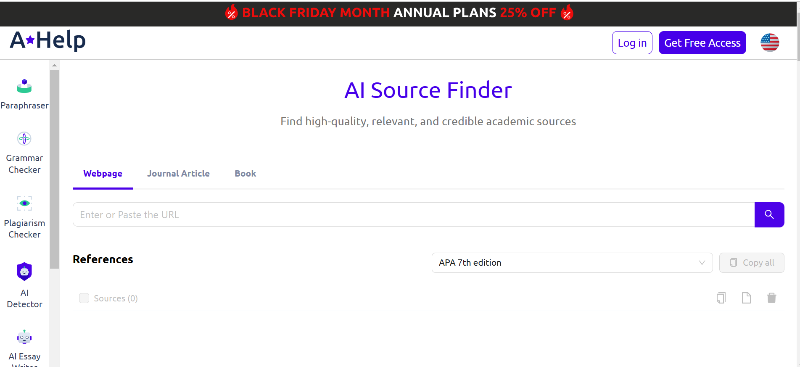
Pros:
- Quick and efficient source identification.
- User-friendly interface with intuitive navigation.
- Supports multiple academic formats.
- Tailored search results for diverse subjects.
Cons:
- Limited customization for niche topics.
- Higher cost compared to some competitors.
Pricing: $96
2. Consensus
Consensus is an advanced AI-powered tool that scans over 200 million scientific papers to provide insights directly from peer-reviewed research. By leveraging language models like GPT-4, it summarizes findings instantly, making it a preferred choice for researchers across various fields.
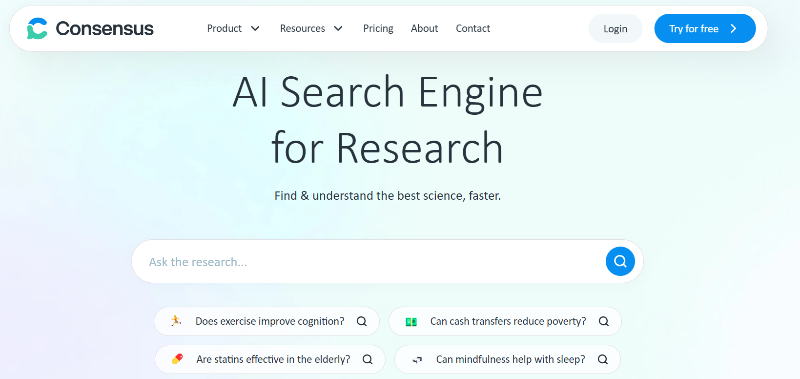
Pros:
- Instant summarization using advanced AI.
- Access to a vast database of peer-reviewed studies.
- Ad-free experience for focused research.
- Strong analytical capabilities for comprehensive insights.
Cons:
- Requires a subscription for full access.
- Limited offline capabilities.
Pricing: $6.99/month
3. Semantic Scholar
Developed by the Allen Institute for AI, Semantic Scholar is a free research tool that provides access to a wide range of scientific literature. It is designed to enhance research efficiency with features like AI-powered search, a semantic reader, and an enriched reading experience.
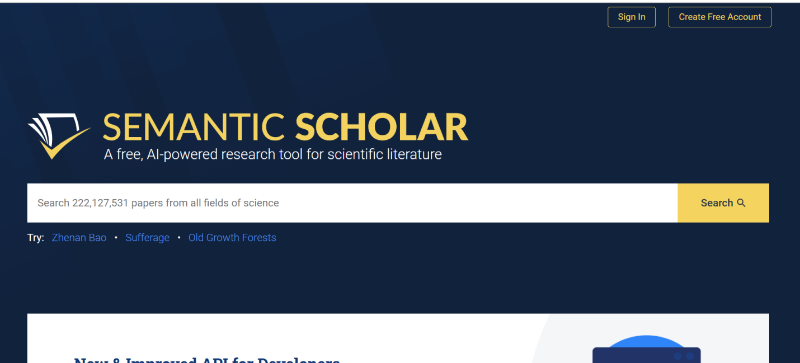
Pros:
- Free access to extensive scientific databases.
- AI-powered search with semantic understanding.
- Intuitive interface with advanced filtering options.
- Beta features like the Semantic Reader for better comprehension.
Cons:
- Some advanced features are still in beta.
- Limited to academic literature, excluding other content types.
Pricing: Free
4. Mendeley
Mendeley is a popular reference management software that helps users organize their research. It allows seamless access to over 100 million articles, along with features for citation management and job discovery in STEM fields.

Pros:
- Free tool with robust reference management features.
- Cross-device access for easy library management.
- Supports a wide range of citation styles.
- Additional resources for career development.
Cons:
- Learning curve for new users.
- Limited storage on the free plan.
Pricing: Free
5. Scite.ai
Scite.ai transforms the way researchers evaluate scientific articles by using Smart Citations. These citations provide contextual information and classify references as supporting or contrasting evidence, thus aiding in better understanding research impact.
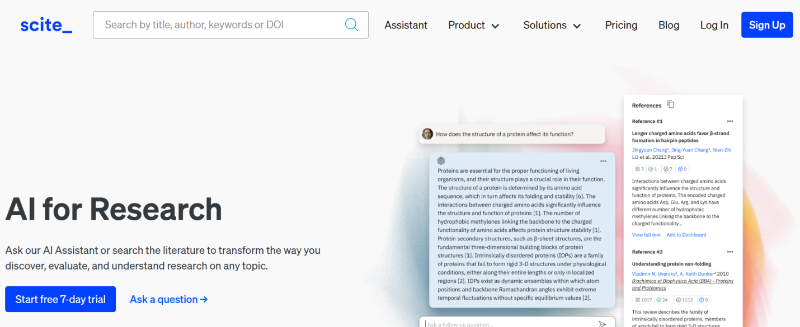
Pros:
- Innovative Smart Citations for context-rich analysis.
- Supports evidence-based research evaluations.
- Trusted by experts in various scientific domains.
- Easy integration with academic workflows.
Cons:
- Monthly subscription required for full access.
- Limited functionality for casual users.
Pricing: $12/month
6. Science.gov
Science.gov is a comprehensive portal for accessing federally funded scientific research. It covers a wide array of subjects, providing access to reports, peer-reviewed publications, and technical data from U.S. government agencies.
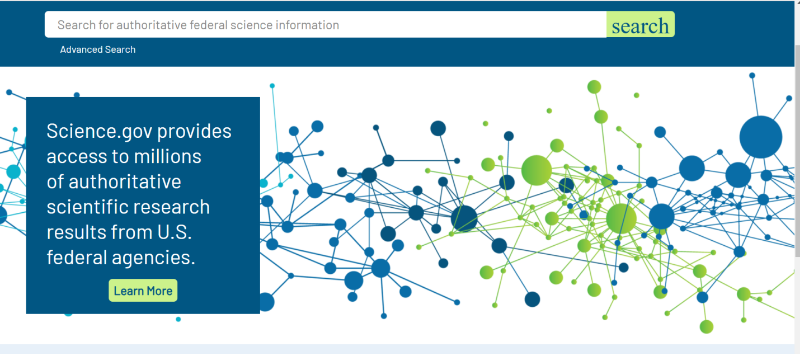
Pros:
- Free access to authoritative research materials.
- No ads or paywalls for content.
- Extensive coverage of scientific fields.
- User-friendly for government research data.
Cons:
- Limited to U.S. government-funded studies.
- Interface can be overwhelming for new users.
Pricing: Free
7. ReadCube
ReadCube is designed for researchers and students looking to streamline their academic research process. It offers tools for managing references, annotating PDFs, and organizing research libraries.
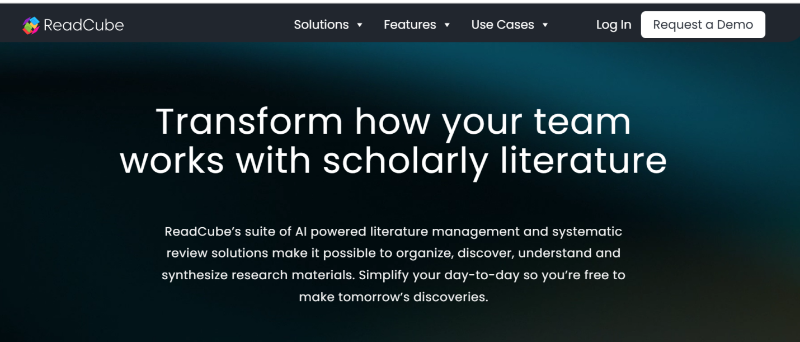
Pros:
- Robust PDF management and annotation tools.
- Cloud-based access to research materials.
- Integration with popular academic databases.
- Supports collaborative projects.
Cons:
- Requires subscription for premium features.
- Limited offline functionality.
Pricing: Free (with premium plans available)
Comparison Table of all AI Reference Finder Tools
| Tool Name | Main Features | Pricing | Referencing Quality |
|---|---|---|---|
| AHelp Reference Finder | Quick source identification, tailored academic search | $96 | 50/50 |
| Consensus | AI-powered paper summaries, access to 200M+ papers | $6.99 | 48/50 |
| Semantic Scholar | Free access to scientific literature, AI-powered search | Free | 47/50 |
| Mendeley | Reference management, cross-device library access | Free | 44/50 |
| Scite.ai | Smart Citations for context-rich analysis | $12 | 50/50 |
| Science.gov | Access to federally funded scientific data, ad-free | Free | 44/50 |
| ReadCube | PDF management and annotation, cloud-based access | Free | 47/50 |
Bonus Tip: Introducing Tenorshare AI ChatPDF
In addition to reference-finding tools, there's a unique AI-powered tool called Tenorshare AI ChatPDF, which can significantly streamline your research process. This tool isn't just for reading PDFs; it also allows you to interact with PDF documents, extract key points, and summarize large volumes of text quickly. Perfect for students and researchers, it offers a smart way to get answers directly from your documents without manually scanning through pages of content.
Key Features of Tenorshare AI ChatPDF
- Interactive PDF Q&A: Allows users to interact with PDF documents by asking questions and receiving direct answers from the content.
- Advanced Summarization: Quickly extracts summaries and key insights from lengthy PDFs, saving hours of manual reading.
- Contextual Search: Utilizes AI to understand the context, ensuring more accurate and relevant information retrieval from documents.
- Seamless Integration: Supports various file formats and integrates with cloud storage for easy access to research materials.
- User-Friendly Interface: Simple, intuitive design makes it easy for both students and researchers to navigate and extract information efficiently.
Tenorshare AI PDF Tool
- Summarize the various types of large PDF documents
- Chat with the PDF to get key information accurately
- Supports simultaneous uploading of multiple documents
Conclusion
AI-powered reference finder tools have transformed how researchers and students gather and manage academic resources. In addition to these reference finders, Tenorshare AI ChatPDF offers an innovative approach for those dealing with PDF documents. It’s more than just a reader—it allows you to interact with PDFs, extract insights, and summarize content efficiently.
You Might Also Like
- Is TinyWow a Scam? An Honest TinyWow Review
- ZeroGPT Paraphraser Review: Features, Price, Pros & Cons, Alternative
- My Honest Review of QuillBot AI Summarizer Pros ,Cons and Pricing
- [Updated] Docalysis AI Read Review, Details, Pricing, & Features
- How to Chat with Your PDF in ChatGPT 2026
- PDF AI Chat Tool Makes Everything Easy: Your Intelligent PDF Assistant

